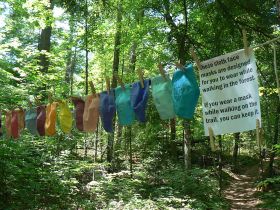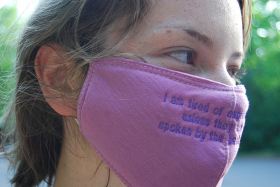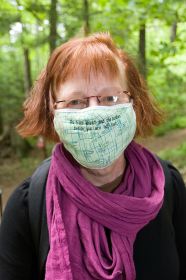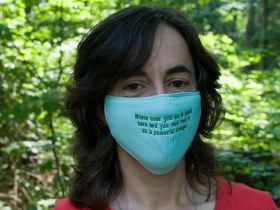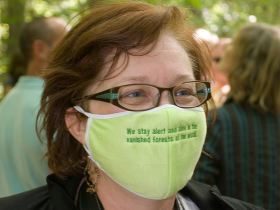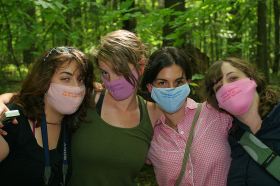Laurie Beth Clark and Frances Westley, USA
Laurie Beth Clark and Frances Westley, USA »Forest Breathing«
These cloth face masks from Vietnam are worn by motor bike riders to protect themselves against fumes and gravel. There is something poignant about fabric face masks, which suggest medical or chemical threats but are neither sterile nor secure. Handmade of everyday fabrics, often in bright patterns, the masks also allow for a personalized poetry that defies the drab uniformity of their manufactured counterparts. In the woods, these masks might be meant to protect the wearer from the environment or the environment from the wearer. The embroidered texts, short quotations from naturalists and poets, offer a range of perspectives about the relationship between humans and the forests, ones that heighten our awareness of that relationship as both empowering and fragile. Situated over the mouth, they denaturalize our interactions with one another by interrupting speaking with writing, overlaying listening with reading.
I am tired of explanations. Unless they are spoken by the best mouths.
Mary Oliver in Wind
I have it in me so much nearer home to scare myself with my own desert places.
Robert Frost in Desert Places
In the gifted air, mosquitos, dragonflies and tattered mute angels no one has called upon in years.
Stephen Dunn in Landscape at the End of the Century
It is a kind of providence that has withheld a sense of history from the thousands of species of plants and animals that have exterminated each other to build the present world; that same kind providence now withholds it from us.
Aldo Leopold in Sand County Almanac
The forest knows where you are. You must let it find you.
David Wagoner in Lost
The trees ahead and the bushes beside you are not lost.
David Wagoner in Lost
This was the habitation, this is the site: here the fat grains of maise grew high/ to fall again like red hail.
Pablo Neruda in The Heights of Macchu Pichu
We stay alert and alive in the vanished forests of the world.
E.O Wilson in Biophylia
Where ever you are is called here and you must treat it as a powerful stranger.
David Wagoner in Lost
The tigers of wrath are wiser than the horses of instruction.
William Blake in Proverbs of Hell
Cloth face masks with embroidered texts by William Blake, Stephen Dunn, Robert Frost, Aldo Leopold, Pablo Neruda, Mary Oliver, David Wagoner, and E.O. Wilson to be worn while walking in the forest. Limited supply available to spectators.


